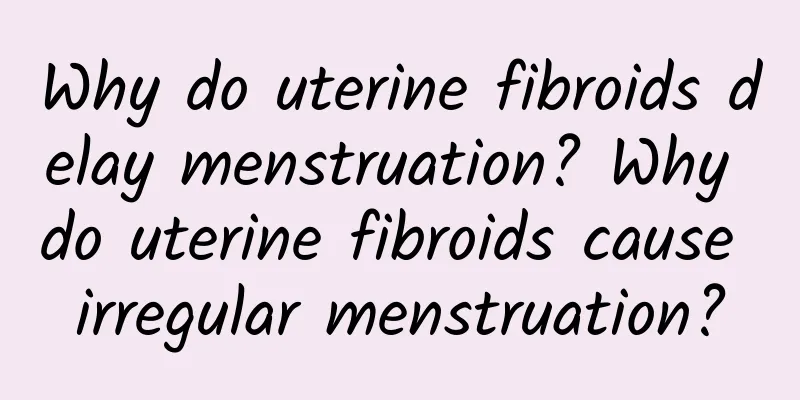Why do uterine fibroids delay menstruation? Why do uterine fibroids cause irregular menstruation?

|
Why do uterine fibroids delay menstruation? Why do uterine fibroids cause irregular menstruation? Uterine fibroids are a common benign tumor in women. They mainly originate from the smooth muscle cells in the endometrium and myometrium. Uterine fibroids usually do not cause symptoms, but in some cases, they may cause delayed or irregular menstruation. First, uterine fibroids can affect the normal growth and blood supply of the endometrium. The endometrium is a layer of tissue lining the uterus that gradually thickens and eventually sheds during the menstrual cycle, leading to menstruation. However, when uterine fibroids grow and press on the endometrium, it may interfere with the normal shedding process of the endometrium, causing menstruation to be delayed. Secondly, uterine fibroids may also cause abnormal contractions of the myometrium. The myometrium is the thickest layer of muscle tissue in the uterus, which is responsible for contracting during the menstrual cycle to expel the shed endometrium from the body. However, when uterine fibroids are present, it may interfere with the normal contraction of the myometrium, leading to irregular menstruation. In addition, the growth of uterine fibroids may also affect ovarian function. The ovaries are the key organs in the female reproductive system responsible for ovulation, and the normal occurrence of menstruation is one of the manifestations of ovarian function. The weight and pressure of uterine fibroids may interfere with the normal function of the ovaries, causing delayed or irregular menstruation. In general, uterine fibroids can affect the normal function of the endometrium, myometrium, and ovaries, which may lead to delayed or irregular menstruation. For women with uterine fibroids, if menstruation is abnormal, they should seek medical attention and treatment in a timely manner. Popular Science Introduction: Uterine fibroids are benign tumors that do not cause symptoms and do not require treatment in most cases. However, for some women with larger or more symptomatic fibroids, surgical treatment may be required. The surgery can be a traditional resection or a more advanced laparoscopic surgery or uterine artery embolization. The choice of treatment for uterine fibroids should be based on individual circumstances, so it is recommended that patients consult a doctor before deciding on a treatment method. Regular physical examinations are an important measure for the prevention and early detection of uterine fibroids. Female friends should maintain good living habits and seek medical treatment in time to protect their health. |
>>: What to eat after uterine fibroid surgery What to eat after uterine fibroid surgery
Recommend
Treatment of pelvic effusion in pelvic inflammatory disease
Many so-called pelvic inflammatory diseases and a...
What to eat during menstruation to detoxify? Eat some whole grains
The menstrual period for women is a process of de...
How to regulate irregular menstruation and what to eat
How to regulate irregular menstruation and what t...
Precautions after surgery for hyperprolactinemia
What are the precautions after surgery for hyperp...
What to do if you have premature ovarian failure at the age of 19
What should I do if I have premature ovarian fail...
What should not be eaten during irregular menstruation
Health care for irregular menstruation, what shou...
What to do with moderate chronic cervicitis
Moderate chronic cervicitis is generally caused b...
Indications and contraindications for abortion
Artificial abortion, also known as artificial abo...
Can eating grapefruit help you lose weight? 8 foods to help you get beautiful legs
[Core Tips]: What can you eat to lose weight in y...
Why do you need to use anal medication after abortion?
Artificial abortion is abortion. After artificial...
People with cervicitis should pay attention to eating
As a common gynecological disease, cervicitis has...
How to treat vaginal candidal infection in pregnant women
How to treat candidal vaginitis in pregnant women...
What are the signs of miscarriage in three months of pregnancy?
I believe you are not unfamiliar with the symptom...
What harm does repeated abortion do to the uterus? How can women prevent uterine infertility through diet?
The uterus is very fragile, which leads to abnorm...
How to treat female cervicitis? 4 dietary treatments for cervicitis
When cervicitis occurs, you can apply potassium p...









